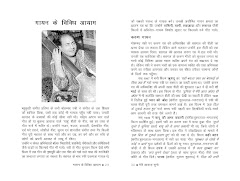Following article was published in the prominent English Daily “The Hindu” on November 1, 2008.
Meri Awaaz Suno 2nd Edition
The second edition of a biography of Mohammad Rafi “Meri Aawaz Suno” hits the stands. We know Mohammad Rafi as a singer par excellence and have grown up on his songs. But we have barely given a thought that he sung several songs for lesser known characters in films. We barely know the names of those who sang those songs in the film, but know the songs too well.
“Jaane Walon Zara” from Dosti, “Suhani Raat Dhal Chuki” from Dulari, “Ae Mohabbat Zindabad” from Mughal-e-Azam, “Badi Door Se Aaye Hain” from Samjhauta, “Tujhe Kya Sunaoon Main Dilruba” from Aakhri Daao are just a few examples. Similarly, his famous qawwalis and songs on children like “Nanhe Munne Bachche”, “Chun Chun Karti Aayi Chidiya”, “Na Hindu Banega” are still the hallmark of good songs with a message.
Daao are just a few examples. Similarly, his famous qawwalis and songs on children like “Nanhe Munne Bachche”, “Chun Chun Karti Aayi Chidiya”, “Na Hindu Banega” are still the hallmark of good songs with a message.
Second edition
These and many such interesting facts are put together in a thin book called “Meri Aawaz Suno” by Vinod Viplav.
This is the second edition of the biography of the same name that was published a year ago by Sachi Prakashan. And within a year, its second edition came many other interesting additions. The book quickly vanished from the stalls at the recent Delhi Book Fair.
Recalls Viplav happily, “Around 300-400 books were bought by Rafi lovers from the stall which was much more than the number of bestsellers sold at the Fair.”
The reason for its quick popularity is its content written in a conversational language and memoirs by those who knew him - from the music directors like Naushad to a fan like Umesh Makhija from Ahmedabad, who has a temple in his home filled with Rafi’s images, Rafi’s family that very few people know about, his peculiar habits like drinking raw milk before the concerts, his differences with some fellow singers and so on.
Despite a few drawbacks like the lack of a proper chronology of songs and an in-depth analysis, the book is still a valuable addition to a Rafi lover’s book stack.
RANA SIDDIQUI ZAMAN
Meri Awaaz Suno 2nd Edition
The second edition of a biography of Mohammad Rafi “Meri Aawaz Suno” hits the stands. We know Mohammad Rafi as a singer par excellence and have grown up on his songs. But we have barely given a thought that he sung several songs for lesser known characters in films. We barely know the names of those who sang those songs in the film, but know the songs too well.
“Jaane Walon Zara” from Dosti, “Suhani Raat Dhal Chuki” from Dulari, “Ae Mohabbat Zindabad” from Mughal-e-Azam, “Badi Door Se Aaye Hain” from Samjhauta, “Tujhe Kya Sunaoon Main Dilruba” from Aakhri
 Daao are just a few examples. Similarly, his famous qawwalis and songs on children like “Nanhe Munne Bachche”, “Chun Chun Karti Aayi Chidiya”, “Na Hindu Banega” are still the hallmark of good songs with a message.
Daao are just a few examples. Similarly, his famous qawwalis and songs on children like “Nanhe Munne Bachche”, “Chun Chun Karti Aayi Chidiya”, “Na Hindu Banega” are still the hallmark of good songs with a message.Second edition
These and many such interesting facts are put together in a thin book called “Meri Aawaz Suno” by Vinod Viplav.
This is the second edition of the biography of the same name that was published a year ago by Sachi Prakashan. And within a year, its second edition came many other interesting additions. The book quickly vanished from the stalls at the recent Delhi Book Fair.
Recalls Viplav happily, “Around 300-400 books were bought by Rafi lovers from the stall which was much more than the number of bestsellers sold at the Fair.”
The reason for its quick popularity is its content written in a conversational language and memoirs by those who knew him - from the music directors like Naushad to a fan like Umesh Makhija from Ahmedabad, who has a temple in his home filled with Rafi’s images, Rafi’s family that very few people know about, his peculiar habits like drinking raw milk before the concerts, his differences with some fellow singers and so on.
Despite a few drawbacks like the lack of a proper chronology of songs and an in-depth analysis, the book is still a valuable addition to a Rafi lover’s book stack.
RANA SIDDIQUI ZAMAN







No comments:
Post a Comment